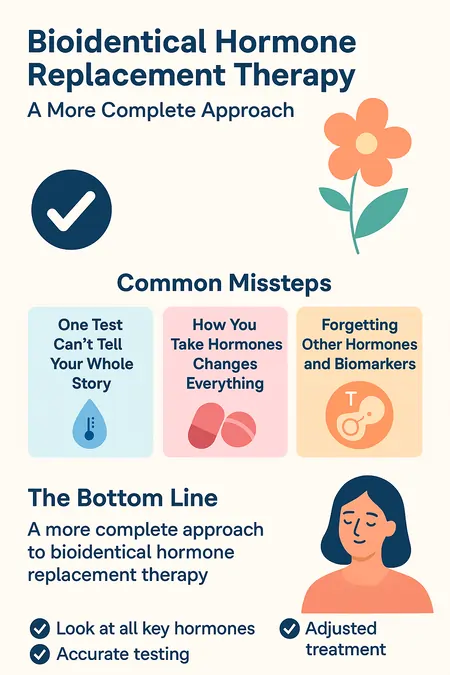The Hormone Hype: When Good Treatments Go Wrong
Just because HRT is a good treatment doesn’t mean it’s always done well - learn how to succeed with HRT!
*IV Ketamine, NR, and NAD+ have been used clinically off-label for decades. They are not FDA approved for the treatment of any psychiatric or pain condition. All medical treatments carry risks and benefits that you must discuss with a doctor at Clarus Health to learn if these therapies are right for you.

Hormone therapy is everywhere these days. Friends talk about how it’s helped them sleep, boosted their energy, or even made them “feel like themselves again.” For many, it really does deliver life-changing results. But just because a treatment is good doesn’t mean it’s always done well.
Hormones are a bit like an orchestra: estrogen and testosterone may get the spotlight, but your thyroid and adrenal hormones set the tempo. When one section is out of tune, the whole performance suffers. That’s where even the best-intentioned treatments can miss the mark.
Hormone Replacement Therapy: A Timely Turning Point
This summer, the FDA’s expert panel took an important step toward modernizing women’s health. They recommended removing the FDA’s strictest safety warning (“black box”) from low-dose vaginal estrogen—a label that has long scared women away from a treatment proven to be safe and effective for various women’s health conditions.
The warning was based on decades-old data and doesn’t reflect today’s understanding. The panel’s decision sends a powerful message: as the science on hormones evolves, your care should evolve with it.

Three Common Hormone Missteps That Limit Results
1. One Test Can’t Tell Your Whole Story
Hormones fluctuate: not just monthly, but daily and even hourly. In PMS, PCOS, perimenopause, and men’s testosterone cycles, the timing and method of testing can make or break accuracy. A single blood test may capture only part of the story, risking a treatment with more side effects. Using the right combination of blood, saliva, and urine testing — on the right days and times — provides safer and more effective treatment. Yet 9 out of 10 people never get full hormone testing – even when they think they have.
2. How You Take Hormones Changes Everything
Hormone treatment is not one-size-fits-all: pills, patches, pellets, creams, and injections each address symptoms differently. For some, a cream may offer a safer profile than a pill. For others, a pellet or a patch may provide specific symptom relief that a gel would miss. The right choice can give you better results more quickly, and it depends on your unique genetic and health profile.
3. Forgetting the Other Hormones and Biomarkers
Hormones are like a family: they all live together and influence each other. Estrogen and testosterone are important, but they can’t work optimally unless your other hormones and vitamin levels are balanced. Adrenal and thyroid hormones, and key micronutrients, comprehensively need to be addressed before correcting sex hormones.
The Bottom Line: A More Complete Approach to Bioidentical Hormone Replacement Therapy
Hormone therapy is a partnership, not a prescription pad. The FDA’s recent move is a reminder that standards are changing, and hormones are more complex, and vital, than previously thought.
The good news? This complexity allows for a more individualized approach, and often greater success, when under the right care. Your health deserves:
- A look at all key hormones and biomarkers to get a complete picture.
- Accurate testing methods and timings to track real-life hormone patterns.
- The right delivery method for your health profile and lifestyle.
- Adequate micronutrient levels, and supplementing, as needed.
- Adjusting treatment as life and stress change, because hormones rarely stand still.
On a personal note: I’ve watched too many patients and family members have their symptoms gaslit because of hormone replacement controversy. My hope is that we replace fears and myths with compassion and informed care, so no one else feels dismissed – and can find the relief they deserve.




